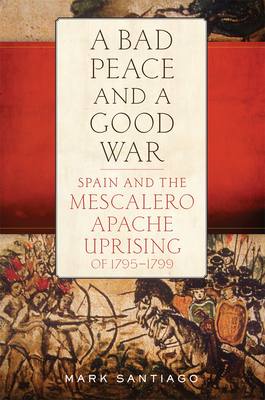A Bad Peace and a Good War: Spain and the Mescalero Apache Uprising of 1795-1799

A Bad Peace and a Good War: Spain and the Mescalero Apache Uprising of 1795-1799
This book challenges long-accepted historical orthodoxy about relations between the Spanish and the Indians in the borderlands separating what are now Mexico and the United States. While most scholars describe the decades after 1790 as a period of relative peace between the occupying Spaniards and the Apaches, Mark Santiago sees in the Mescalero Apache attacks on the Spanish beginning in 1795 a sustained, widespread, and bloody conflict. He argues that Commandant General Pedro de Nava's coordinated campaigns against the Mescaleros were the culmination of the Spanish military's efforts to contain Apache aggression, constituting one of its largest and most sustained operations in northern New Spain. A Bad Peace and a Good War examines the antecedents, tactics, and consequences of the fighting. This conflict occurred immediately after the Spanish military had succeeded in making an uneasy peace with portions of all Apache groups. The Mescaleros were the first to break the peace, annihilating two Spanish patrols in August 1795. Galvanized by the loss, Commandant General Nava struggled to determine the extent to which Mescaleros residing in "peace establishments" outside Spanish settlements near El Paso, San Elizario, and Presidio del Norte were involved. Santiago looks at the impact of conflicting Spanish military strategies and increasing demands for fiscal efficiency as a result of Spain's imperial entanglements. He examines Nava's yearly invasions of Mescalero territory, his divide-and-rule policy using other Apaches to attack the Mescaleros, and his deportation of prisoners from the frontier, preventing the Mescaleros from redeeming their kin. Santiago concludes that the consequences of this war were overwhelmingly negative for Mescaleros and ambiguous for Spaniards. The war's legacy of bitterness lasted far beyond the end of Spanish rule, and the continued independence of so many Mescaleros and other Apaches in their homeland proved the limits of Spanish military authority. In the words of Viceroy Bernardo de G lvez, the Spaniards had technically won a "good war" against the Mescaleros and went on to manage a "bad peace."
PRP: 279.94 Lei
Acesta este Pretul Recomandat de Producator. Pretul de vanzare al produsului este afisat mai jos.
251.95Lei
251.95Lei
279.94 LeiIndisponibil
Descrierea produsului
This book challenges long-accepted historical orthodoxy about relations between the Spanish and the Indians in the borderlands separating what are now Mexico and the United States. While most scholars describe the decades after 1790 as a period of relative peace between the occupying Spaniards and the Apaches, Mark Santiago sees in the Mescalero Apache attacks on the Spanish beginning in 1795 a sustained, widespread, and bloody conflict. He argues that Commandant General Pedro de Nava's coordinated campaigns against the Mescaleros were the culmination of the Spanish military's efforts to contain Apache aggression, constituting one of its largest and most sustained operations in northern New Spain. A Bad Peace and a Good War examines the antecedents, tactics, and consequences of the fighting. This conflict occurred immediately after the Spanish military had succeeded in making an uneasy peace with portions of all Apache groups. The Mescaleros were the first to break the peace, annihilating two Spanish patrols in August 1795. Galvanized by the loss, Commandant General Nava struggled to determine the extent to which Mescaleros residing in "peace establishments" outside Spanish settlements near El Paso, San Elizario, and Presidio del Norte were involved. Santiago looks at the impact of conflicting Spanish military strategies and increasing demands for fiscal efficiency as a result of Spain's imperial entanglements. He examines Nava's yearly invasions of Mescalero territory, his divide-and-rule policy using other Apaches to attack the Mescaleros, and his deportation of prisoners from the frontier, preventing the Mescaleros from redeeming their kin. Santiago concludes that the consequences of this war were overwhelmingly negative for Mescaleros and ambiguous for Spaniards. The war's legacy of bitterness lasted far beyond the end of Spanish rule, and the continued independence of so many Mescaleros and other Apaches in their homeland proved the limits of Spanish military authority. In the words of Viceroy Bernardo de G lvez, the Spaniards had technically won a "good war" against the Mescaleros and went on to manage a "bad peace."
Detaliile produsului








